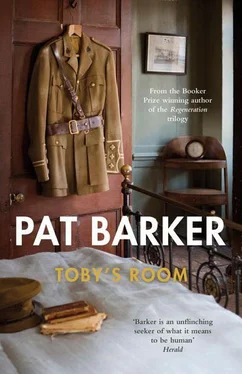‘This?’
‘No, Tarrant’s … whatever.’
‘As I say, I rarely see him.’
Neville turned his head to look at the portraits again.
‘What are you thinking?’ Tonks asked.
‘Nothing special. Churned-up flesh; churned-up earth. If you take the other features away, the wound becomes a landscape.’
‘Well, I’ve always thought landscape’s the only way of telling the truth about this war.’
Neville jerked his head at the portraits. ‘They don’t do badly.’
‘They can’t be shown.’
‘Like Goya’s engravings. The Disasters of War .’
Tonks burst out laughing. ‘Oh, Mr Neville, you flatter me.’
‘Do you think I was wrong?’
‘What about?’
‘Taking off the mask. Do you think it was wrong?’
‘Not if it was uncomfortable.’
‘You know what I mean.’
A groan of indecision. ‘I get angry too, you know. One of the convalescent homes we use — the neighbours have asked for the men to be kept indoors, so they don’t have to look at them. Of course that makes me angry. So no, I don’t think you were wrong, but I also think a lot of the people there would have been entirely sympathetic. It’s just, they don’t know what to do. They’re afraid their own faces will … I don’t know. Show something.’
‘Revulsion. Yes. And they’re absolutely bloody right. They do.’
Neville looked away for a moment, the muscles of his face and neck working with distress. ‘What’s going to happen next?’
‘The next operation? You’ll have the pedicle reattached.’
‘Just the one?’
‘Yes, I think so; you’d have to check with Gillies.’
‘One of the chaps in the next hut has three. I don’t mind looking like an elephant but I draw the line at squids.’ He watched Tonks work for a while. ‘Will you be there?’
‘In the operating theatre? Yes.’
Neville was cursing himself for revealing a need for reassurance from a man he’d always disliked. ‘Not that I’ll know who’s there and who isn’t, I’ll be well out of it.’
‘And there’ll be morphine afterwards.’
‘I think I dread that almost more than the pain. You have such terrible dreams. Dreams? More like hallucinations.’
A few minutes later Tonks said, ‘Well, that’s me finished.’ He stood up and put his pastels to one side. ‘Would you like to see it?’
‘Not if the others can’t.’ Neville was already on his feet, itching to leave. ‘Do you know I’ve been made a war artist?’
‘Yes, I heard.’
‘The thing is, I can’t paint here. And I can’t paint in that overcrowded loony bin up the hill either.’
‘You mean, the convalescent home?’
‘Whatever. I need to get away.’
‘I’ve been thinking about that. I had a word with Gillies and of course he’s sympathetic. We’ll see what we can do.’
Neville had been prepared for a fight and felt rather deflated to find it wasn’t necessary. He held out his hand, startled, not for the first time, by how cool Tonks’s skin was. Of course his hands were miles away from his heart.
‘Thanks.’
‘No need, I’m only too pleased to help. If you find Radcliffe waiting outside would you send him in?’
After lunch, Neville asked permission to leave the grounds and set off across the fields, carrying a sketch pad and pencils. After half an hour’s walking, he reached the brow of a hill. All around him were gorse and hawthorn bushes so deformed by the prevailing wind they seemed to be frozen in the act of running away. Below him, a shallow valley striated by hedges stretched up to a wooded ridge. It amazed him that Tarrant could still find pleasure in painting the English countryside, as apparently he did, when not working office hours at the Slade. Neville saw only potential battlefields. Nameless English woods became, in the blinking of an eye, Devil Wood, High Wood, Sanctuary Wood. It took no time at all to blast craters into these fields, splinter the trees, and blow up the farmhouse over there. And as for trying to take that ridge …
Plod, plod, on he went, putting one foot in front of the other, numbed, almost hypnotized, by the sight of his moving feet. He was remembering the preparations for the battle. Two solid weeks of training over ground dug out to look like the German trenches they were supposed to take. Drums beating, hour after hour, to simulate the sounds of a bombardment, as if drums could begin to suggest what it was like to endure sound breaking in blast waves on your skin.
As a stretcher-bearer he’d been spared most of these mock attacks. Instead, he washed iron bedsteads in an arsenic solution designed to discourage bed bugs (it didn’t); and he organized Brooke’s sick parades, which were always well attended. ‘Old soldiers’ hoping for a day off, men suffering from trench foot — not nearly as many of those as there used to be — and, of course, malingerers. Old soldiers and malingerers are very different people. Brooke prided himself on being able to spot a malingerer half a mile away. Invariably, they were given a dose of No. 9 and sent straight back to duty. Laxatives: a strange remedy for men who were shitting themselves. Of whom Neville had been most definitely one.
In the few minutes he’d been standing there, the sky had begun to clear. Fitful sunshine chased cloud shadows across the land. But, despite the improvement in the weather, he decided to turn back, though he’d meant to walk a lot further than this. The truth was, he didn’t know where he wanted to be. Nowhere was the right place.
By the time he reached the hospital, he was almost running in his eagerness to get back, though he knew he couldn’t face the hut where that bloody gramophone playing the same songs over and over again jangled his nerves. Instead, he went to sit in the conservatory at the back of the house. This was easily the quietest place in the whole hospital, and it had become his favourite refuge.
He was all the more dismayed, therefore, to open the French doors and find that Trotter had got there before him. They nodded to each other, before Neville picked up a newspaper and went to sit some distance away. Trotter had a tray on his knees and was playing one of his endless games of patience. Sunlight cast faint shadows on the floor. It was warmer in here and there was no sound except for the slippery whisper of cards sliding under cards. Neville tried to concentrate on his paper, but his eyes were heavy. He was on the verge of nodding off to sleep like some pathetic old man in front of the fire. Trotter’s absorption in the game fascinated him. That ray of light on the side of his face …
‘Where’s Doc?’ somebody said. Nobody ever called Gillies that, but then, after a moment’s reflection, he realized they must mean Brooke. It was dark outside, an immense yawning darkness unbroken by any gleam of light. From miles away you could hear the rumble and thud-thud of the guns. They were gathered round a table in what had once been the farmhouse kitchen, playing cards. Candlelight, reflected up into their faces, made the undersides of their eyes bulge like lids. Boiler, with red, shining skin stretched tight across his cheekbones. Hen Man — so called because he was good at finding chickens that had fallen victim to enemy action; many a bowl of chicken broth the patients owed to him. Evans, the Welshman, a blatherskite if ever there was one, talked so fast the spit flew. Wilkie, a strange, lopsided, big-eyed, uncoordinated sort of boy, given to sudden collapses when his knees went from under him. Bit of a shock if you were on the other end of the stretcher; even more of a shock if you were on it. A more ill-favoured crew it would have been hard to find, and yet this light made them beautiful.
‘So,’ Hen Man said. ‘What do you think he gets up to?’
Читать дальше












